A guest post from Tanya Plattner of Tidy Life Happy Wife
You decluttered the entire house and it looks fantastic. Now you need to keep it that way. Here are 7 organizing tricks to prevent the clutter from creeping back in.
Decluttering can feel like a never-ending cycle. You finish a project and it piles back up before you even notice it’s happening.
That nicely organized capsule wardrobe turned into a closet explosion in just a few short months and you didn’t see it coming. Now you can’t find your favorite sweater and hanging anything up is a losing battle.
You’re back to the drawing board and need to declutter the closet again. This time, take an extra step to get it organized and keep the clutter away.

How do you organize and get rid of clutter?
To organize and get rid of clutter, you need to understand the differences between them.
Decluttering is simply removing the things you don’t need, use, or enjoy. It’s getting rid of the excess.
Organizing is finding the perfect place to store the things you do keep. The perfect storage and organizing solution will help prevent clutter from sneaking in.
How do you stop cluttering?
Want to stop cluttering? Stop bringing home things you don’t really need or have room for.
Think long and hard before bringing new items into your home. Figure out exactly what you’ll use them for and where you’ll store them when not in use.
Consider whether you already own something else that could be used, or if you could easily borrow it from a friend.
The less things you have in your home, the more likely they won’t become clutter.
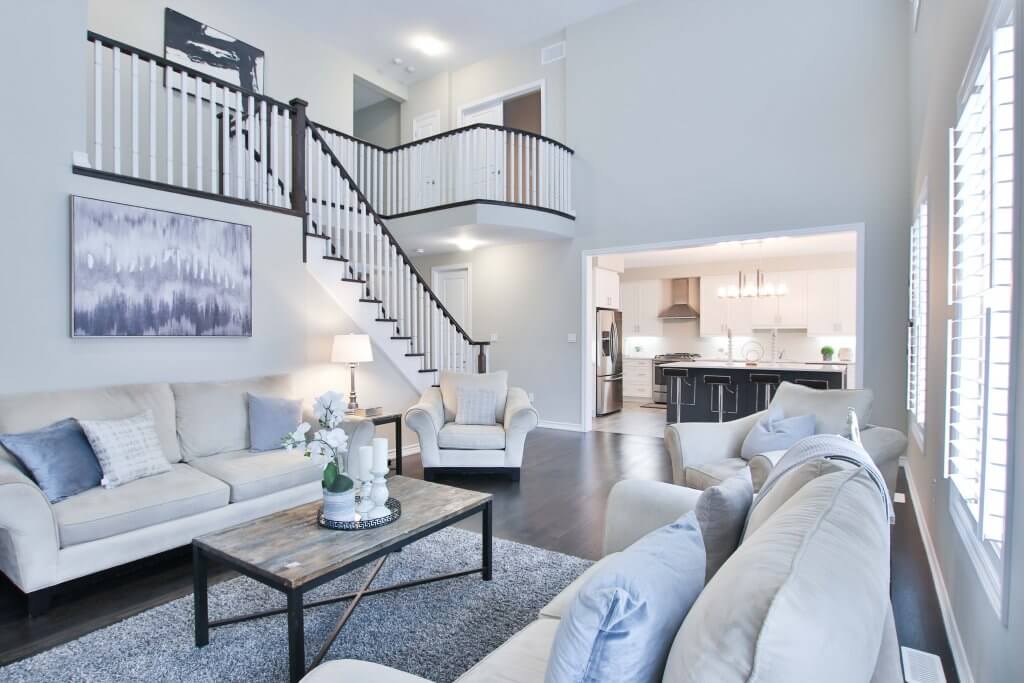
7 Organizing Tricks That Help Prevent Clutter
The most common organizing questions I get are ‘Which organizing bins work best?’, and ‘Where do I get the cute baskets?’
Organizing is a bit more strategic than just buying a cute bin or basket to put things in. It’s about finding the perfect place to store exactly the amount of stuff you need.
To properly organize any space and keep the clutter away, you need the right solution for you. Here are some organizing tips to prevent clutter.
1. Go Paperless and Use Digital Organization
Paper contributes to the clutter problem in many homes. The best solution is to go paperless and organize documents digitally.
It can be a little intimidating, but going paperless is liberating. It prevents excess paper from entering your home and eliminates those annoying paper piles and overstuffed filing cabinets.
You can switch to paperless statements and bills for most banking and utility companies. They keep all applicable information online and accessible 24 hours a day, 7 days a week. Plus it’s a lot easier to find what you’re looking for.
For documents that aren’t available online through the issuing institutions, scan and organize digital copies on your computer. You can use a thumb drive, external hard drive, or cloud storage for a backup copy.
Go all in by opting out of mass mailings so you don’t have to deal with junk mail either.
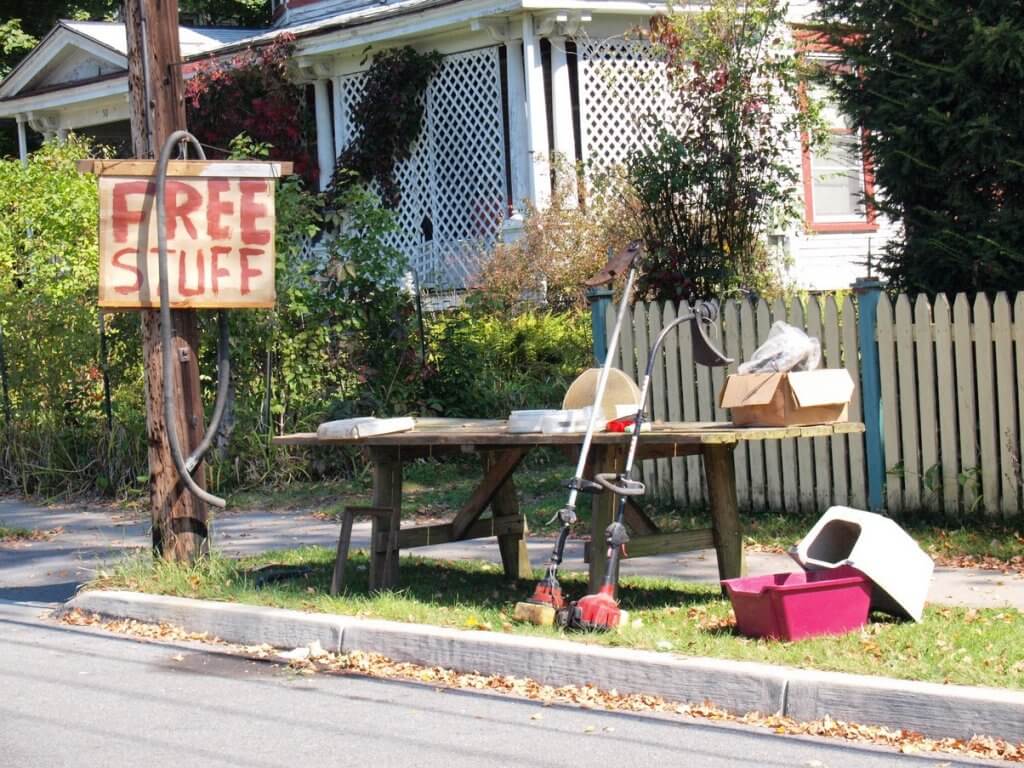
2. Say NO to Free Stuff
Are you the type of person that can’t pass up a ‘buy one, get one free’ deal? Do you have a bumper sticker that warns, ‘this car makes frequent stops for curbside furniture’?
Free isn’t really free if you can’t or won’t use it. It just contributes to the clutter in your home.
The ‘buy one, get one free’ deal on those cube organizing systems is a steal if you have somewhere to put both of them. If not, you’ll end up leaving one in the garage until you get tired of tripping over it, and finally give it away.
That ‘free curb find’ dresser is a great deal if you use it, but it’s going to cost you plenty if you push it up against a wall somewhere until you get frustrated enough to donate it or take it to the dump.
Seriously, just say ‘No Thank You!’ to free stuff unless you have a specific and immediate use for it.
3. Buy Individual Items, Not ‘Sets’
Sets of anything are typically a waste of money and space because people rarely use the entire set. That’s true for linens, pots and pans, and most other things you can purchase in a set.
When we bought our first home, we started hosting large family dinners. We were cooking a lot of food on a pretty regular basis.
I decided to upgrade my cookware and got sucked in by the 20-piece deal from Calphalon. I even bought an additional 6-quart frying pan and lid to make it 22 pieces, because it was bundled with the set for a killer price.
That set had pots and pans for every meal I could ever imagine preparing, and some that I never would. 15 years after purchasing the set, I still had pots I’d barely used.
Yes, that means I just stored some of them for 15 years. Imagine how good I become at organizing pots and pans!
I didn’t want to get rid of them because they were brand new, but I knew I’d never use them and they were taking up space.
Save yourself some frustration and learn from my mistake. Only buy what you need regardless of how good the deal seems at the time.
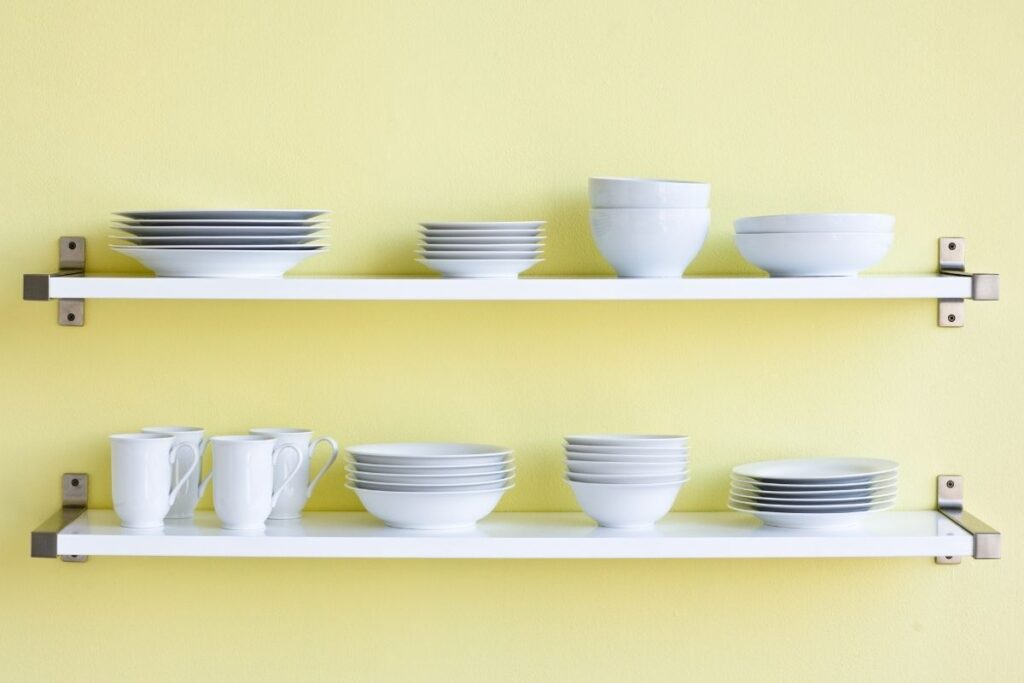
4. Use Open Closet and Storage Systems to Recognize Clutter Right Away
Doors and drawers are the best friends of clutter. Out of sight is out of mind until it’s in the way.
Remove closet or cabinet doors so you can easily see everything. Try open shelving, closets, and storage systems to keep your stuff organized and visible.
Clear plastic bins and drawer systems are perfect for smaller items and open shelving works great for the bigger stuff. Open organizing systems make your things quicker and easier to access, and make awkward spaces usable.
Open systems help you stay organized and prevent clutter because the moment something becomes disorganized or begins to pile up, you notice right away.
If you are someone who is sensitive to visual clutter and this one sounds like a nightmare for you, skip it. Different organizational systems work for different people and that’s totally ok!
5. Buy ‘Just Right’ Sized Organizing Containers
Never buy baskets, organizing bins, or containers before you know what you need to store. You’ll always want to declutter first and then see what your needs are.
Buying the wrong size container can actually contribute to your clutter if you aren’t careful.
Once you’ve decluttered, identify which items you’re keeping and where you’d like to keep them. Find an appropriate-sized container that has just enough room to organize the stuff you’re keeping and will fit in the space you want to store it in.
Get a bin that’s too small and you’ll have to find somewhere else to put your things. Buy one that’s too big and you run the risk of keeping things you don’t really need, just because they fit.
If that wicker basket is perfect for your hair products but it won’t fit under the sink, it’s going to end up living on the counter and contributing to the clutter anyway.
Right-sized organizing containers can be your best tool to prevent clutter.

6. Use Organizing Bins to Prevent Clutter in Hidden Spaces
Hidden spaces are all of those drawers and cubbies where everybody tosses those miscellaneous items that are quickly forgotten.
Most people have that proverbial ‘junk drawer’ where things go to live in anonymity. If it’s really junk, get rid of it all. If it isn’t junk, use small bins and organizers to keep it all in its own place.
There are tons of drawer dividers and organizing systems on the market that help corral and organize your hidden spaces.
Once you find the appropriate sized containers, prevent future clutter by labeling the organizer to identify exactly what belongs where.
7. Organize Things Near Where You Use Them
A recurring challenge I hear about keeping the home decluttered is the habits of other family members. Along with that, I am often asked ‘how do I get my spouse and children to just pick up after themselves?’.
My answer is always, ‘make it easy.’ Organize things in a way that makes sense for everybody. When things are easy to find and convenient to put away, you have a chance.
If you store your spices in the pantry across the kitchen, they’re going to be left on the counter and clutter the space. Organize them in a cabinet or drawer close to the stove, and they’re easier to put away quickly after use.
Making sure things will fit in the space you want to organize them in is important. Organizing things as close as possible to where they’ll be used will prevent them from becoming clutter.
Organizing to Prevent Clutter
Decluttering and organizing are two different things, but they work together to create a well-functioning home.
Prevent clutter from entering your home by going paperless and using digital organization solutions. Start saying no to free stuff you can’t really use, and buy only what you need regardless of how good of a deal you can get on an entire set.
Use open storage, right-sized containers, and hidden space organizers to keep your rooms organized and make clutter accumulation obvious as soon as it starts happening.
Last but not least, get your entire family on board by making organization solutions convenient and easy to maintain.
An organized home is a clutter deterrent and these organizing tricks will help you prevent clutter in your home.
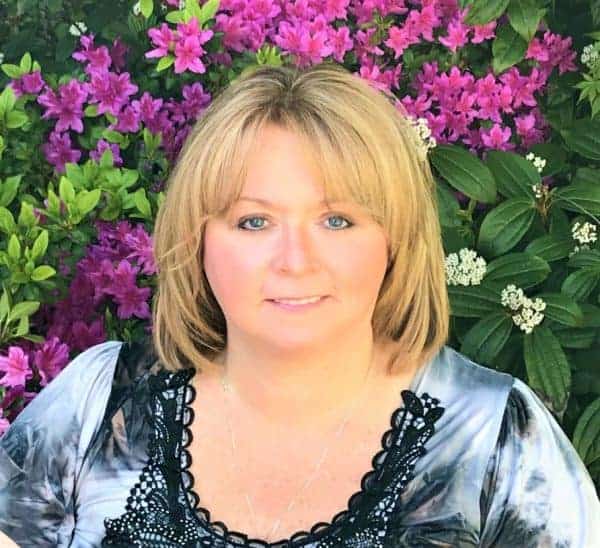
Tanya Plattner is the founder of tidylifehappywife.com where she helping women clean, declutter and organize their way to a stress-free home and life.
Want to keep up to date with The Simplicity Habit? Sign up on the form below and get weekly decluttering tips sent straight to your inbox! You’ll also get the free Your Home Decluttered Jumpstart which includes 100 easy items to declutter and 12 high impact areas to declutter in 10 minutes.

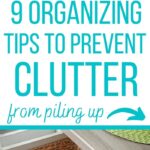
I too must have bought the same caphalon pot and pan set and extra pieces. It was a great deal also but have many pieces I have never used. I’m going to start taking all the pots and pans out I do t use put in a box in the garage and see if I need any of them
It sounds so simple when you put it like this…great advice!
I’m so glad you enjoyed the post, Tracey!
Very simple and straight-forward. They are good tips, especially the one about being aware of the supposed “good deals” out there. My husband loves a good deal, so he has to be careful to weigh things and determine whether it’s truly a good deal. Especially since he has that mentality of always wanting to have spares, so he’s not against buying more than you’ll actually use. (We do need to have spares of some things, but there are limits).
There are some things that the best list of tips can’t help with, although maybe this one should be included in these lists, simply as a reminder to those looking for advice to fix their problems. Sometimes, sometimes, what we really need is not the perfect basket or ideas of how to pick what clothes to keep and what to toss. It’s simply that thing we call “self-control”. And self-awareness. Some people don’t put things away, no matter how quick and easy it would be to do, simply because they are in a hurry and they are always on to the next thing before they have really finished dealing with the previous thing, for example. Therefore, what they need is not a certain organization style or decluttering strategy. What they need is simple self-awareness and to learn how to slow down.
Just some thoughts I had while reading this list. They are good tips for those who are willing to make the best use of them, but if that willingness is lacking, there is something more fundamental that needs to change. Maybe the next time either you or Tanya does a list like this, maybe it should include a proverbial “kick in the pants” to remind the reader that lists of tips won’t help them if they have a deeper problem with motivation, laziness, procrastination, etc. 🙂
I’m bathroom decluttering for the hundredth time!
The problem is my husband, who dumps his stuff in the cupboard so he can find it again. But any old how, not in its designated place. Then when he needs it he shuffles my organised cupboard upside down because he never put whatever it was in the right place.
I’ve started labeling baskets in the hope that he will take the hint. I put his stuff away in the right place… doesn’t work. He’s so impatient. He will open a new shampoo because the old one is 3/4 done.
I decanted 4 different shampoos today into one press bottle (because it comes out faster.) Heck, I don’t care if they are different. The end result is the same. I just keep refilling it. Those press bottles never get thrown away because I use them for shower gel, which often comes in a tube.
So most of my decluttering is keeping on top of what’s almost over. If I don’t watch it, those bottles go to the back. no matter how organised I get.
My old towels go to the farm for the dogs, unwanted pots and pans go to the farm staff. Or anyone that wants it. After over 50 years of housekeeping you can accumulate a formidable amount of junk. Working on it.